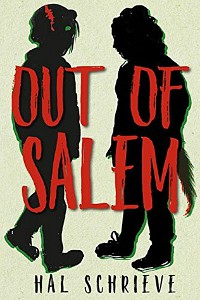4.5 stars When I saw that cover and read the blurb, I was ready for an epic queer urban fantasy adventure. I mean, doesn’t that just sound badass? Two fourteen-year-olds: a nonbinary witch zombie, and a Muslim lesbian werewolf. I have read many urban fantasy books where the supernatural creatures live in secret, so IRead More
Genevra Littlejohn reviews Out of Salem by Hal Schrieve
The night I was born, the attending nurse turned to my mother with a weird expression on her face. She noted that I had long delicate fingernails, and already a head of black hair; that a trail of fine baby hairs ran down my spine. “In the old days, you know, they’d have said sheRead More
